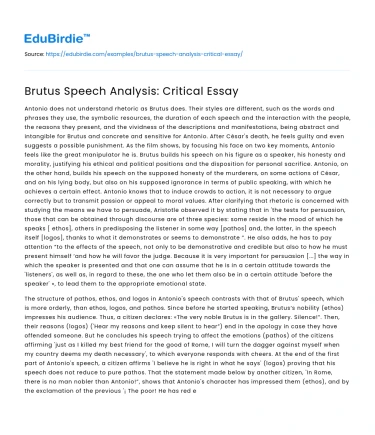Antonio does not understand rhetoric as Brutus does. Their styles are different, such as the words and phrases they use, the symbolic resources, the duration of each speech and the interaction with the people, the reasons they present, and the vividness of the descriptions and manifestations, being abstract and intangible for Brutus and concrete and sensitive for Antonio. After César's death, he feels guilty and even suggests a possible punishment. As the film shows, by focusing his face on two key moments, Antonio feels like the great manipulator he is. Brutus builds his speech on his figure as a speaker, his honesty and morality, justifying his ethical and political positions and the disposition for personal sacrifice. Antonio, on the other hand, builds his speech on the supposed honesty of the murderers, on some actions of César, and on his lying body, but also on his supposed ignorance in terms of public speaking, with which he achieves a certain effect. Antonio knows that to induce crowds to action, it is not necessary to argue correctly but to transmit passion or appeal to moral values. After clarifying that rhetoric is concerned with studying the means we have to persuade, Aristotle observed it by stating that in 'the tests for persuasion, those that can be obtained through discourse are of three species: some reside in the mood of which he speaks [ ethos], others in predisposing the listener in some way [pathos] and, the latter, in the speech itself [logos], thanks to what it demonstrates or seems to demonstrate ”. He also adds, he has to pay attention “to the effects of the speech, not only to be demonstrative and credible but also to how he must present himself ’and how he will favor the judge. Because it is very important for persuasion [...] the way in which the speaker is presented and that one can assume that he is in a certain attitude towards the 'listeners', as well as, in regard to these, the one who let them also be in a certain attitude 'before the speaker' », to lead them to the appropriate emotional state.
The structure of pathos, ethos, and logos in Antonio's speech contrasts with that of Brutus' speech, which is more orderly, than ethos, logos, and pathos. Since before he started speaking, Brutus’s nobility (ethos) impresses his audience. Thus, a citizen declares: «The very noble Brutus is in the gallery. Silence!”. Then, their reasons (logos) ('Hear my reasons and keep silent to hear”) end in the apology in case they have offended someone. But he concludes his speech trying to affect the emotions (pathos) of the citizens affirming 'just as I killed my best friend for the good of Rome, I will turn the dagger against myself when my country deems my death necessary', to which everyone responds with cheers. At the end of the first part of Antonio's speech, a citizen affirms 'I believe he is right in what he says' (logos) proving that his speech does not reduce to pure pathos. That the statement made below by another citizen, 'In Rome, there is no man nobler than Antonio!”, shows that Antonio's character has impressed them (ethos), and by the exclamation of the previous '¡ The poor! He has red eyes like the fire of so much crying” we know that he has been moved (pathos). But this commotion will increase as Antonio throws fuel into the fire. In the end, however, we are not better able to judge the truth of Brutus’s statements than Antonio's. We have been at the mercy of the worst rhetoric and without the force of reason. This explains the ambiguity prevailing throughout the work: if a point of view is formulated persuasively, it is accepted enthusiastically as if it were an absolute truth.
Save your time!
We can take care of your essay
- Proper editing and formatting
- Free revision, title page, and bibliography
- Flexible prices and money-back guarantee






 Stuck on your essay?
Stuck on your essay?

